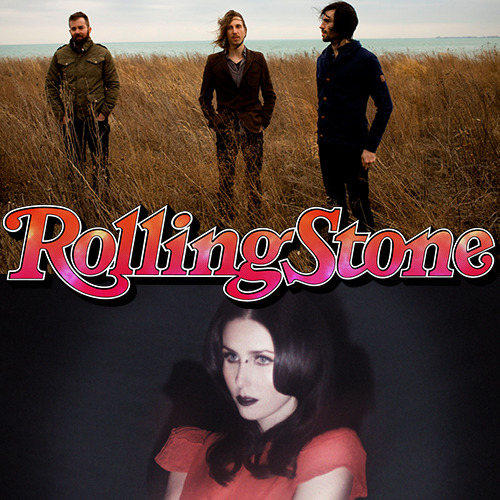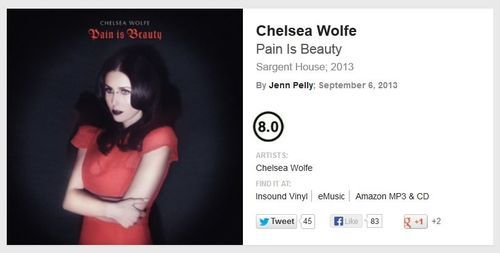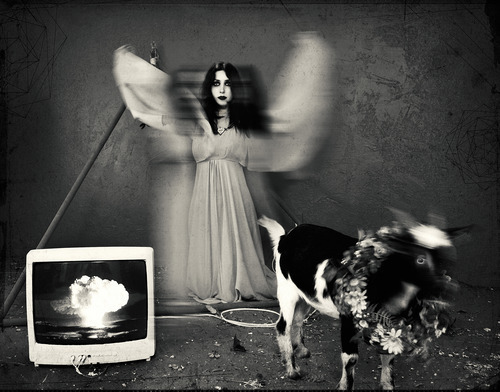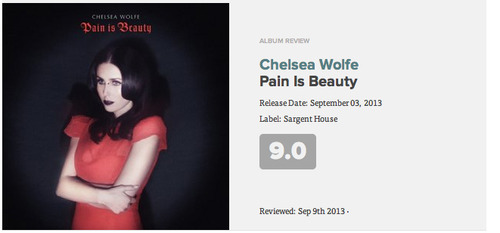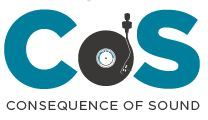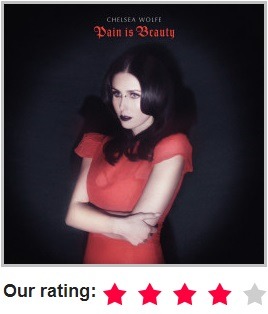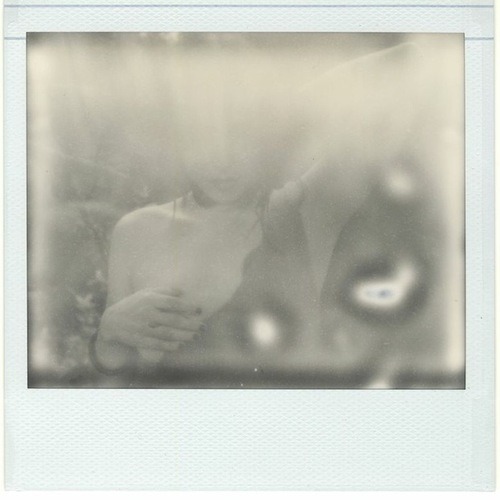
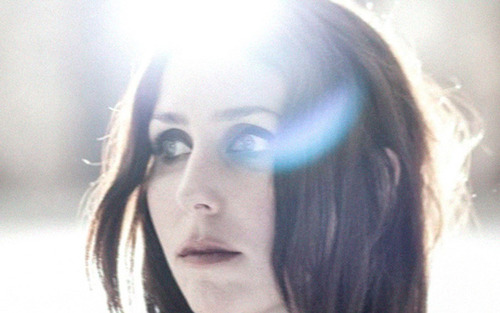
Chelsea Wolfe is an omnivore personified. While many artists claim to be so special snowflake-y as to transcend genre, Wolfe really does, with influences as diverse as PJ Harvey, Townes Van Zandt, and Burzum. Listening to her dark art-folk concoctions, one vacillates between empathetic and unnerved; her distinctive voice is equal parts haunting and haunted, natural and supernatural, shiveringly vulnerable and coldly elemental.
Born and raised in northern California, Wolfe spent much of her youth writing songs on keyboard and guitar, inspired by the country and folk records of her country musician father, as well as louder stuff like Led Zeppelin and Black Sabbath. As an adult, she grew more serious about music, putting a band together and releasing her debut full-length The Grime and the Glow in 2010.
In 2011, she moved to Los Angeles and recorded her follow-up Apokalypsis, which pricked up many ears with its skillful mixture of spooky atmospherics, plaintive melodies, and big, open chords like waves lapping at some icy black shore. The following year, she released Unknown Rooms, a collection of acoustic songs exploring her minimalist folk roots. All of these wanderings were threaded together by Wolfe‘s dark — but not cheesy –aesthetic and versatile voice.
Now, with the support of her longtime bandmates, including co-producer Ben Chisholm, she’s back with another studio album, Pain Is Beauty, a “love letter to nature” that combines elements of all that came before while showing an increasing interest in electronic elements. It’s the kind of record you put on when you want to be transported from the daily bullshit of Twitter fights and smelly subway cars to some ancient, melancholy precipice over the void. Or, conversely, if you just want to listen to some great fucking sad person music.
Before embarking on her imminent world tour, Chelsea took some time out to talk to Hive on the phone from her home in L.A. about California, sad girls, and whether there’s any hope for mankind. She was also kind enough to soldier on with the interview after slamming her finger in a door, which we appreciate.
What was it like growing up in northern California?
I really like northern California… when I was a kid we would go camping a lot. We’d go see the giant redwood trees and I really loved that… I just love California in general.
How do you feel about the ocean? It seems to pop up a lot in your lyrics.
I love the ocean, I love water in general and I really love to swim…I love being around bodies of water.
Did you have any kind of subcultural affiliation in high school?
I was somewhere between being an outcast and being friends with everyone… my friends and I would walk around during lunch and talk to anyone, really. I was friends with the metal kids, the jocks, I had friends in every different group. I guess I didn’t really fit in anywhere… I tried a lot of different things, sports and things like that, but I was never really part of one particular group.
It’s good to hear you were not a stereotypical outcast. What kinds of boys did you like?
I always liked boys with long hair. Like, metal guys.
Do you still?
Yeah… I mean, I like lots of different kinds of people.
I have a friend who will only date guys who look like goth cowboys.
I have a good friend who’s definitely a goth cowboy, so if she ever wants to meet him, she can come to L.A.
Maybe we can hook them up?
Totally.
So what kind of music did you like growing up? Your dad was a musician, yeah?
My dad was a country musician while I was growing up, so I definitely got turned onto a lot of really good old country when I was a kid. One of the first people l I really loved was Hank Williams, and Johnny Cash… my dad would listen to Fleetwood Mac a lot and his band would cover Fleetwood Mac songs, so I always really loved Fleetwood Mac; that band taught me a lot about harmonies. Also, my dad turned me onto Led Zeppelin and Black Sabbath and stuff like that in high school.
Oh yeah, I was going to ask how you went from country to “darker” kinds of music… not that country can’t be dark!
I guess I wasn’t really into dark music per se ever… I don’t feel like my musical tastes really shaped the kind of music that I make. I didn’t listen to a lot of music in general growing up, other than what my dad would show me. But eventually different friends and bandmates turned me onto black metal bands and some other bands, so I have a pretty wide range of different kinds of music that I like.
I just came across an article that namechecks you as one person responsible for bringing Burzum (and black metal in general) to a wider indie rock audience. How do you reconcile your love of this music with the deplorable beliefs of the guy (Varg Vikernes) who makes it?
When I first moved to L.A. I didn’t have many friends, I stayed alone a lot in my house and recorded things. I had recently started listening to black metal and really liked this song “Black Spell of Destruction” by Burzum. It had so much beautiful white noise and his voice was like an animal’s snarl. I woke up one day early, maybe 6 or 7 a.m. and had an idea to cover this song so by 8 a.m. I was working on it, recorded it that day, put it on YouTube and kind of forgot about it. But then a writer Brandon Stosuy who used to be at Stereogum posted it up, and since he’s very influential it was the first many heard of me. So really, we can thank this strange black metal man for people hearing about me.
I don’t think anything I did brought any more or less fame to him — he was a black-metal-music making, church-burning… uhm, and he killed someone from Mayhem — I don’t think he needed any help getting famous. I didn’t know anything about him when I covered him, to be honest. I also didn’t do that cover to get any recognition, I did it because I liked a song and I was bored and lonely.
That’s fair. So a lot of people get mad if you call them “Goth.” They’re like “No, I’m death rock” or “I’m post punk” or whatever. Do you have a problem with the term?
No, because I have so many different styles of music within this one project. I’ve done acoustic folk stuff, I’ve done rock and roll, electronic songs on my new album. I really don’t like to feel boxed in or put labels on my own project, but whatever people wanna call it is fine with me. It’s gonna be different depending on your background and which album of mine you hear first.
Are there any people making music now who you’d consider to be kindred spirits?
I don’t usually really group myself in with anyone. I usually leave that up to people, because everyone does that anyway.
How about just artists you like?
We’ve definitely gotten to play with a lot of bands I like in the past year. Over in Japan, we got to open for Swans and Queens of the Stone Age this year. Those are all three bands I like and really look up to.
I heard a band covering one of your songs at St Vitus the other night. How do you feel about it when people cover you?
It’s definitely a new thing for me, I’m used to covering other people’s music. But recently Mark Lanegan did an album with a lot of covers on it, and he covered one of my acoustic songs called “Flatlands,” and that was a pretty big honor cause I really love his voice.
Rad! You’re about to go on tour — are you stoked? Do you like that part of your job?
Yeah, I’ve grown to like it. It was a big challenge at first because I didn’t like being onstage in front of people. Over time I’ve just sort of accepted it, knowing it’s part of my job as a musician. But ideally I think I would be invisible when I played live.
I’m looking forward to playing with True Widow, they’re going on tour with us, they’re a great band. I think it’s gonna be a fun time.
What helped you get more comfortable onstage? Was it the fans, or something else?
Yeah definitely, the energy of the audience — the room and everything — it’s definitely a lot easier to let go and get into the music. If there’s any sort of technical difficulty or people are talking or not paying attention, I get distracted and it makes it harder, but typically I’ve found that people are really respectful, and I guess I’ve been getting better at being onstage. I just make sure to give it my all no matter what, even if I’m really uncomfortable, because I think it’s important. People came out to see a show and I want to give them everything I have.
It’s funny you say you want to disappear, because I feel like your visual aesthetic is more a part of the experience than it is for most bands who get covered on Pitchfork or whatever.
I don’t typically do a lot of visuals live other than a bit of lighting or something like that, because I want people to be able to close their eyes and see what they see when they hear the music, but I think the reason I dress up sometimes and have gotten into fashion and things like that is it actually helps me overcome my stage fright. At first I would wear a veil over my face and wear all black and cover myself up because I’d really wanna be invisible, and it helped me get through it, but eventually I decided that I needed to stop. I didn’t want it to become some sort of gimmick or something, like “girl that wears a veil,” you know? Eventually I overcame that and instead of totally covering myself up, I decided to dress up and have fun with it, depending on whatever mood I’m in that night. So I guess that helped me with not wanting to be on stage, dressing up for the occasion.
On the topic of your aesthetic, I’m also thinking about the album art and the fact that you publish your lyrics. It reminds me of when I was a kid and I’d buy a CD and look at the art and read all the words and digest them. Now, people just listen to mp3s in their iTunes. Is that experience important to you? The album as a physical object?
Yeah, I think it’s nice that I’m finally on a label that allows me to do that, which is great…in the past I had to keep it really simple due to budget issues. But with my label, we were finally able to do a bit of artwork, and we brought in an outside artist, his name’s Trevor Hernandez, and he put together the layout. And I knew that I wanted to have themes of intense nature and feeling uncomfortable in the spotlight, and I think it came together really cool and it was fun for me to try, making more extensive artwork for an album.
What do you do to unwind when you have a break at home? It’s hard to picture you, like, eating a Dominos pizza and watching trashy TV.
I typically go visit family up north. I have a lot of family that lives in the hills about 4 miles out of town in the woods, and I really like to go up there and spend time with family. In the winter I like chopping wood and weird meditative things like that. I really love to swim, another meditative thing for me. I definitely like TV but I don’t have one at the moment, so…I think I don’t have one so I don’t watch it all the time, you know?
Yeah, totally. But when you do watch TV, what shows do you like?
I like watching those kinds of shows where they fix up old houses and stuff like that. Or, like, the History Channel is always a good one. National Geographic, that kind of shit.
Do you ever watch “Ancient Aliens”? I’m not sure how this qualifies as history, but it’s all about aliens making contact with humans over the centuries.
I haven’t seen that one, but I’ve heard about it.
So you’ve got a lot of natural imagery in your new album’s lyrics and also a lot of horror imagery, and it kind of reminded me of Lars Von Trier’s “Antichrist.” Have you seen that movie? Did you like it?
It was definitely an interesting persepctive on nature… obviously visually, the way it was portrayed which was really intense and beautiful. I think he’s got a pretty amazing eye.
I got in some arguments with my friend, who is sort of a gender essentialist, after seeing this movie. Do you think there is anything especially animalistic about being a woman?
I think there’s an instinctual sense within women and it’s also kind of reflected in pure love, this sense of survival and doing anything to survive and protect your family, and that’s kind of what I was thinking about, love in an animalistic sense, but it could also be an instinctual thing.
On that note, this might be a dumb question, but what’s your favorite animal?
I love cats. When I was a small kid my grandmother took me to an animal sanctuary and this cheetah and I made eye contact. He walked up to me slowly and then we stared at each other for maybe 5 minutes straight. I took a photo of him and felt really connected to big cats from then on. I asked my dad to buy me this giant poster of a black panther laying across a red ’80s corvette when I was in elementary school. He didn’t understand why I wanted a car poster, but all I could see was this majestic cat!
That’s funny. So the lyrics you write are sort of broadly interpretable. Are you thinking of current events at all when you create this sort of bleak vision of the world? Or is it more personal?
It kind of depends… when I wrote “The Waves Have Come,” I’d just watched a documentary about the earthquake and Tsunami in Japan. So certain songs are certainly affected by world events and things like that, but it kind of depends on the song.
We’re about to bomb Syria, that’s pretty crazy.
Yeah, that’s pretty intense, I was just talking about that with my family. I mean, there’s always shit going on, but it kind feels like the world is going crazy right now.
Yeah. I thought about that when I listened to your song “Kings.” Is that one about world leaders?
I can’t actually remember what I was thinking about when I wrote that song. It’s kind of a combination of things in your personal life, falling from grace…but it could also be a larger take on leadership and the world. I’m really sorry, I just slammed my finger in the door really hard so I’m a little distracted.
I’m sorry! Are you okay?
Yeah. I’m just a little bit distracted.
[a pause in which I make sure she’s okay to continue talking]
It’s cool that your songs can apply to such different things. Do you generally want people to figure out what they’re about, or do you like that they can have different meanings?
I prefer to leave them open to interpretation, because I like people to have their own take on things. I don’t like defining my songs for people even if I know what they mean to me, I don’t want them to know exactly what they’re about and take whatever their own experience is and their own outlook and reflect it onto the song so they can understand it for themselves and what it means to them.
Is this ultimately a nihilistic record? Do you think there’s any hope for humanity? Or will you leave that open to interpretation, too?
I’m always kind of looking at things in a very back and forth way… in the macro sense, I get overwhelmed thinking about the world at large and how much there is going on and how it seems so unfixable…and when I think about it in the micro, small relationships, being good to the people around you and being patient and kind and things like that, that’s also important. I go back and forth thinking about the world at large and the smallness of our own lives.
I feel that. So before you said you were influenced by literature and other nonmusical stuff — what kind of stuff are you into now or when you were writing this album?
I really like DH Lawrence “Sons and Lovers,” a book that I’ve read a couple times, it’s inspired a lot of songs, the way that he writes about nature and the relationships in the book. I really love Werner Herzog films, and sometimes when I’m feeling uninspired or bored with life I’ll watch his films and get inspired, because he makes everyday situations all over the world feel really magical and beautiful and special for me.
What’s your favorite place outside of where you live now?
I really love going to Norway and Sweden, Scandanavia in general I suppose. I guess my favorite place in the world is California, but on tour i’m always happy to go to Stockholm, Sweden, and Oslo, Norway.
Are there parallels between the two? California is thought of as some sort of sunshine state, but it’s got spooky forests too, right?
It’s kind of like everything here, which is what’s so great about it. I sound like an ad for a California tourism commercial or something.
They should hire you to make some ads for them!
I think Best Coast has that covered. Didn’t she write a song about California?
Yeah, but it was a different kind of song. You could start a campaign to make sad girls come to Cali.
Sad girls? Is that what you said? (laughing) Am I a sad girl? Is that how I come across?
I don’t know if you’re a sad girl, but your music definitely has sad girl appeal. You tell me!
I dunno. I mean, I hope it appeals to lots of different kinds of people, but sad girls are definitely welcome.
We appreciate it. I mean, I say I’m a sad girl… I’m actually pretty happy with my life, but I love sad music the most.
Yeah, totally. We all love sad music sometimes.
Pain Is Beauty is out now via Sargent House.




